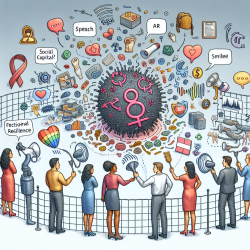Introduction
The COVID-19 pandemic has significantly impacted mental health, particularly among university students. This situation has underscored the need for innovative mental health interventions that adhere to physical distancing guidelines. A recent study titled "Remotely and collaboratively evaluating a campus-based therapy dog program during the COVID-19 pandemic" provides valuable insights into the effectiveness of remote animal-assisted activities (AAAs) in enhancing mental health and social connections.
Understanding the Research
The study conducted at the University of Saskatchewan evaluated the "PAWS Your Stress" program, a remote AAA designed to promote mental health and social connection. The evaluation revealed that even without physical interaction, remote AAAs can facilitate human-animal connections and provide mental health benefits. The study employed collaborative strategies and innovative evaluation methods like the Most Significant Change (MSC) technique to gather qualitative data on program outcomes.
Implementing Research Outcomes
Practitioners looking to improve their skills and program effectiveness can draw several lessons from this research:
- Remote Program Feasibility: The study demonstrates that remote AAAs are feasible and can effectively engage participants. Practitioners should consider incorporating remote elements into their programs to reach a broader audience.
- Collaborative Evaluation: Engaging stakeholders in the evaluation process can enhance program effectiveness. Practitioners should involve program users in planning and evaluation to ensure the program meets their needs.
- Use of MSC Technique: The MSC technique can be a valuable tool for identifying significant program outcomes. Practitioners should consider using this qualitative method to capture participant experiences and program impacts.
Encouraging Further Research
While the study provides a solid foundation, further research is needed to explore the long-term impacts of remote AAAs and their applicability in different contexts. Practitioners are encouraged to conduct their own evaluations and share findings to contribute to the growing body of knowledge on remote mental health interventions.
Conclusion
The evaluation of the "PAWS Your Stress" program highlights the potential of remote AAAs to support mental health during challenging times. By implementing collaborative evaluation strategies and innovative methods like the MSC technique, practitioners can enhance program effectiveness and contribute to improved mental health outcomes.
To read the original research paper, please follow this link: Remotely and collaboratively evaluating a campus-based therapy dog program during the COVID-19 pandemic.










